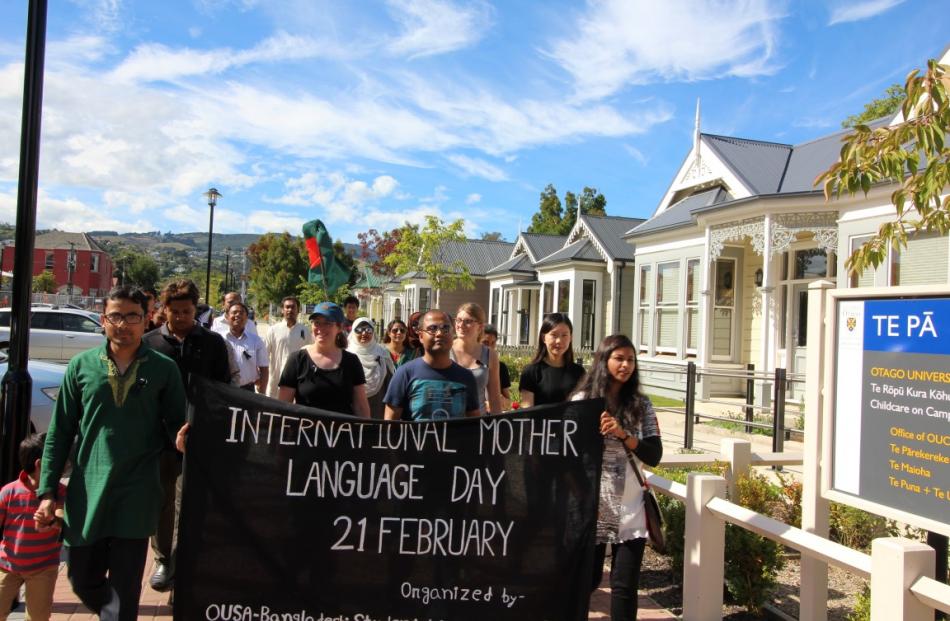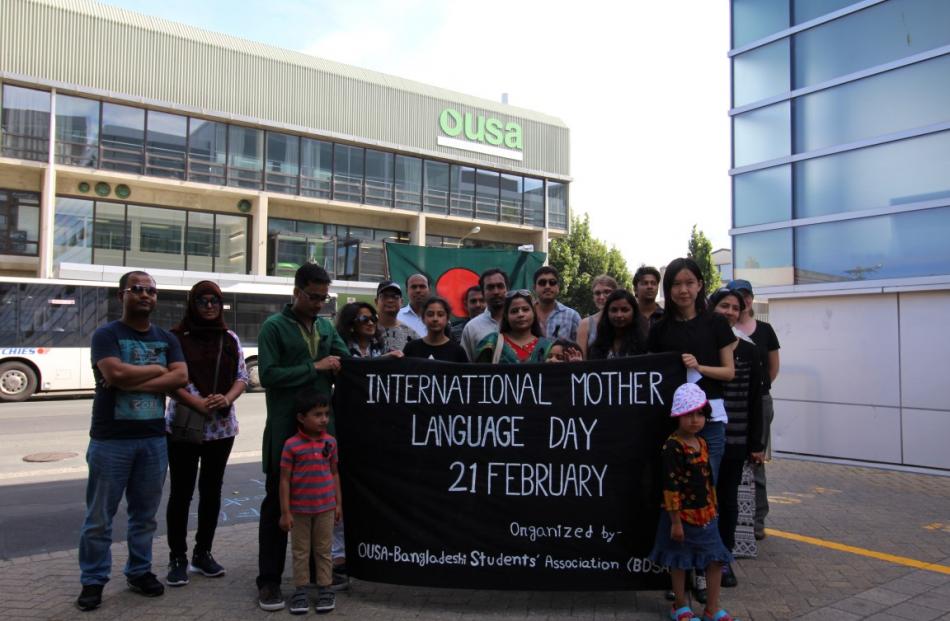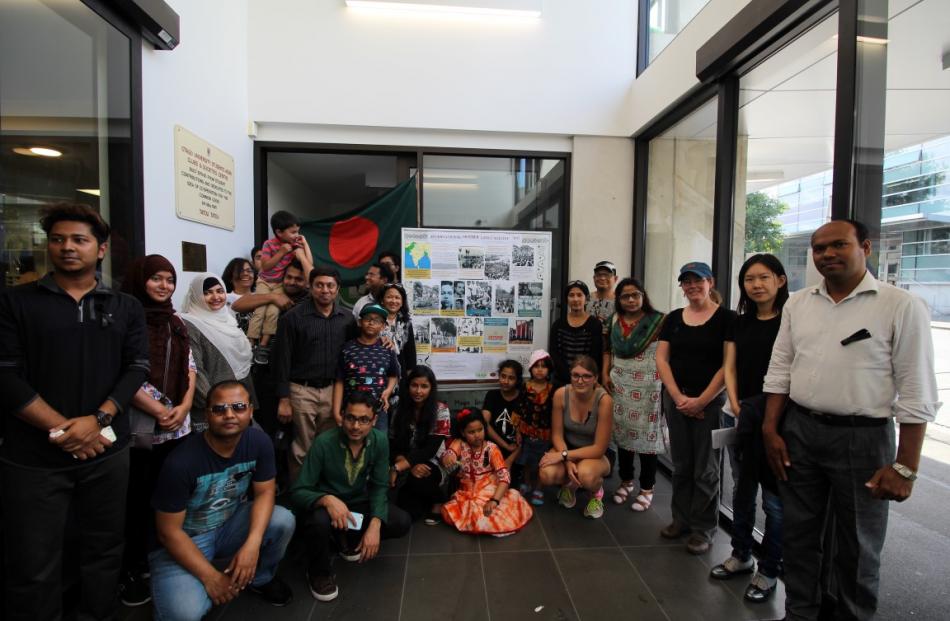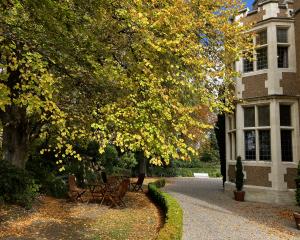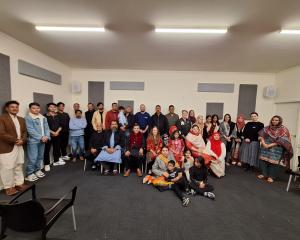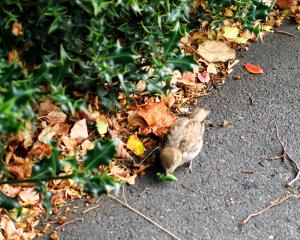A group of students and staff with their family and friends arranged a rally in the premise of University of Otago on February 21 to celebrate International Mother Language Day (IMLD).
The rally commenced at 04:15 pm from the junction of Castle Street and Dundas Street, participants were seen wearing black badges and murmuring the iconic 21st February (Ekushe) anthem (Can I forget the twenty-first of February/incarnadined by the blood of my brother?). The rally went through the Pathway sculpture and concluded in front of Otago University Student Association (OUSA) club and society centre.
After the rally, all the participants gathered in the foyer of OUSA club and society centre building to view the photo exhibition arranged by OUSA-Bangladeshi Student’s Association. It was an effort to aware people about the history of IMLD through pictures. Associate professor, Kimberly J. Hageman from the Department of Chemistry with two students Xiaolin and Camille participated in the rally. They all appreciated the theme of International Mother Language Day and Bangladeshi people’s sacrifice for their mother language. Another participant mentioned, “the rally is not any act of remonstration, but our ritualistic way to pay homage to the martyrs, as a Bangladeshi, we are really proud to organise this event”.
Some children were seen happily participating in the rally with their parents. Senior lecturer from the Centre for Materials Science and Technology Dr Azam Ali commented, “On the occasion of IMLD, which I think will encourage our children and young generation to know about IMLD and its significance”. Also, another senior lecturer from School of Pharmacy, Dr Shyamal Das added “I am extremely happy to see that BDSA has organised the celebration of IMLD at the University of Otago. IMLD teaches us how to respect everyone’s mother language and encourages to save mother language in the adverse situation”.
21st February, the language movement day, a glorious part of the history of Bangladesh is globally celebrated as the International Mother Language Day (IMLD) since 2000. The date corresponds to the day in 1952 when students of different educational institutions lost their lives in a protest for the recognition of Bangla (known as Bengali by non-natives) as one of the two state languages of east Pakistan (present Bangladesh). On 17 November 1999, the United Nations Educational, Scientific and Cultural Organization (UNESCO) recognised this language movement and proclaimed the International Mother Language Day. UNESCO’s proposed theme for IMLD in 2017 is “Towards Sustainable Futures through Multilingual Education”, in line with the theme of UNESCO's Global Monitoring Report on Education “Education for People and the Planet: Creating Sustainable Futures for All”.
Language day is the culmination of a series of protests and events that took place between 1948 and 1952. The partition of British India in August 1947 gave birth of a new country called Pakistan, comprising of two far-flung wings in the west and east, separated by sixteen hundred kilometres of foreign territory.
A majority of the people of the geographically non-contiguous East Pakistan (present Bangladesh) province were Bangalee or Bengali, the speakers of Bangla language. However, tension started to build when the then ruling government declared Urdu as the sole state language. As a consequence, the Bengali students of the University of Dhaka and other activists organised a protest on 21st February 1952. The protest further intensified as several student demonstrators were shot dead by the police on that day. After years of conflict, in 1956, Bangla was recognised as one of the state languages.
In Bangladesh, 21st February is celebrated as Language Movement Day, a national holiday. A monument (Shahid Minar) has been built near to Dhaka Medical College to commemorate the martyrs of language movement. On this day, Bangladeshi people pay homage to the language martyrs by offering flowers and wreaths and spending a moment of silence at Shahid Minar.
Each year on 21st February, Bangladeshi community in the major cities of New Zealand celebrate International Mother Language Day through community gathering. To promote the multicultural stance, Bangladeshi Student’s Association (BDSA) and Otago University Student Association (OUSA) have come forward this year to celebrate the International Mother Language day in the premises of the university.
BDSA is the very first association for Bangladeshi students formed in 2016, an affiliate of OUSA. The purpose of creating such association is mainly to support students studying currently at the University of Otago and are willing to study in future by providing relevant information. And, also to present Bangladesh and her culture by organising various events in the university.
The participants including Dr Pallab Biswas from the Department of Accountancy and Finance, feel honoured to celebrate the day in Dunedin, New Zealand. All of them express utmost gratitude to University of Otago authority and Bangladesh Students’ Association for supporting and making the event successful.
- Farah Shawkat

